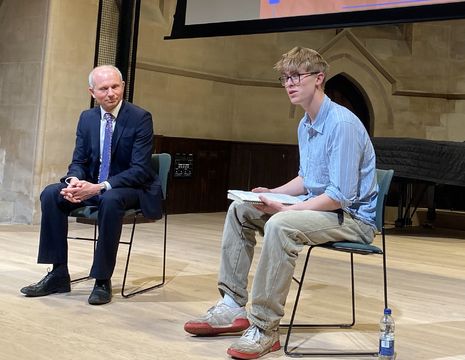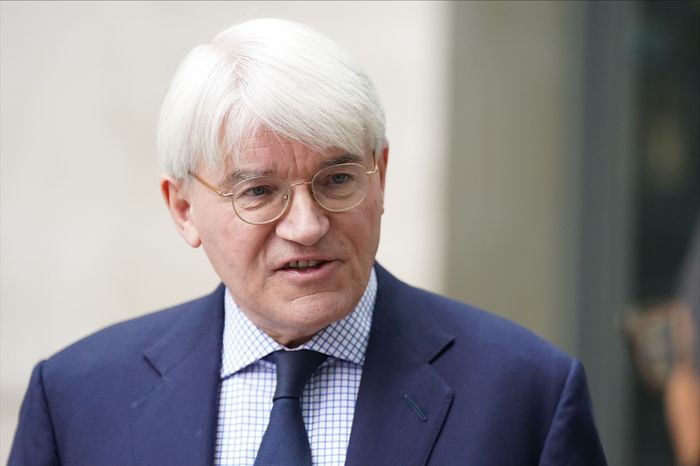Rt Hon Sir David Lidington: the Prime Minister who never was
Jude Crawley speaks to Theresa May’s Deputy Prime Minister on his time in and after politics.

It was March 2019 when David Lidington’s name hit the headlines. Sunday papers talked of a ‘Remainer’ plot within Theresa May’s cabinet to oust May and install Lidington as a caretaker prime minister. As the longest serving Europe minister in recent history, and May’s de-facto ‘Deputy’ Prime Minister, Lidington becoming Prime Minister was far from the wildest idea in 2019 British politics.
When I asked him how these headlines had emerged, Lidington was quick to reassure. “I did have a number of cabinet ministers who came to me and said look, we think that Teresa's position is going to become untenable” he tells me. The ‘remainer’ cabinet members asked Lidington “Could you step in and you know, try and hold the show together?”
Lidington told his cabinet colleagues, and the Sky News cameras parked outside his house, that Theresa May had his full support. He tells me he only would have considered the role of caretaker prime minister if May had chosen to step down, something he believes her Chistian faith would have prevented, and if there was “consensus around the cabinet table”.
Ultimately when May was toppled by a frustrated Tory Party, Lidington resigned in anticipation of a Boris Johnson premiership. He suspects it was one of his more Brexiteer cabinet colleagues who had leaked the interim PM story to the press - though he refuses to give a name, he divulges that the suspect went on to run for the leadership. “There, that gives you a shortlist” he chuckles.
"Last time round it took from 1997 to 2005, six years for the party to decide it wanted to win"
Lidington is evidently uncomfortable with the current direction of his party. Throughout our conservation, he returns to Suella Braveman as the prime example of insane Conservatism, decrying her recent Telegraph piece as “mad” and musing he was lucky that his successor MP for Alisbury was not a Braveman-type. He has seen his party go mad before. Following a PhD in Tudor History at Cambridge, Lidington entered Conservative politics in the late 1980s, before becoming MP for Ailsbury in 1991. He vividly remembers the Conservative’s last spell in opposition: “Last time round it took from 1997 to 2005, six years for the party to decide it wanted to win and therefore it needed [..] a different approach” he says, pausing to adjust his tie, blue with pink swirls tumbling down, “I hope it doesn't take that long again.”
While Lidington resists my attempt to get him to endorse a current MP in the seemingly inevitable Conservative party leadership election, he says there are a couple of MPs who “have the right grasp of where the party needs to go”. Lidington suggests Tom Tugeghat, Gillian Keegan, Victoria Atkins and Bima Falomi as future leaders, lamenting the thought of the party “letting Farage in”.
Lidington turns to his brief stint as Justice Secretary to locate his proudest achievement over his long political career. He describes his personal success in resolving the issue of Britain denying prisoners voting rights, which was ruled a violation of Human Rights by European courts in 2005. Britain does continue to deny almost all prisoners voting rights, but Lidington introduced a scheme allowing prisoners in the final year of their sentence to commute from prison to work and re-enfranchised these offenders. This was enough to satisfy the European Courts, and Britain was deemed to no longer be in violation of the EU Convention of Human Rights.
This seemed almost small scale for a man who was once the second most senior politician in Britain. But clearly it stood out to Lidington because of how central a role he personally played, “calling round the justice ministers of Europe” and going “to Strasbourg and make[ing] the case”.
"every day try to read something has nothing to do with work"
Talking more widely about the failure of the May government, it does not seem particularly personal to Lidington as his diagnosis of the collapse of May is almost entirely structural. “There were majorities in the House of Commons against any cause of action” he said with an air of nonchalance, and May could not have solved this without crossing the personal red-line of “doing as little harm as possible to the union”. Lidington has only one question he keeps asking himself. Could the Brexit deadlock have been overcome if he had entered into negotiations with Corbyn’s labour earlier?
As the most senior representative of the government in the cross-party talks which took place in April 2019, Lidington describes a major sticking point with the Labour negotiating team, led by then-shadow Brexit Secretary Sir Keir Starmer.
Labour insisted on using the term a customs union. “We basically said we are prepared to accept the Customs Union in all but name”, Lidington tells me, despite May repeatedly telling the media a customs union was not on the cards. Ultimately, “it came down to a bit of politics involved”.
A historian at heart, Lidington has tried to devote time to historical reading throughout his political career. He credits this habit to a piece of advice his first boss, Thatcher’s Foreign Secretary Douglas Hurd, gave him in the late 1980s: “every day try to read something has nothing to do with work [...] to remind me that there is a world out there to go back to when the politics finishes”.
Nowadays, the politics has finished for Lidington. He spends his time chairing a security think tank and tries to spend one day a week rifling through historical archives in London, revisiting his passion for history stimulated as an undergrad at Sidney Sussex. His next career move? A book on William Cecil, Elizabeth I’s chief minister for over 40 years - a political career only marginally longer than Lidington’s own.
 Comment / Plastic pubs: the problem with Cambridge alehouses 5 January 2026
Comment / Plastic pubs: the problem with Cambridge alehouses 5 January 2026 News / Cambridge businesses concerned infrastructure delays will hurt growth5 January 2026
News / Cambridge businesses concerned infrastructure delays will hurt growth5 January 2026 News / New movement ‘Cambridge is Chopped’ launched to fight against hate crime7 January 2026
News / New movement ‘Cambridge is Chopped’ launched to fight against hate crime7 January 2026 News / AstraZeneca sues for £32 million over faulty construction at Cambridge Campus31 December 2025
News / AstraZeneca sues for £32 million over faulty construction at Cambridge Campus31 December 2025 Interviews / You don’t need to peak at Cambridge, says Robin Harding31 December 2025
Interviews / You don’t need to peak at Cambridge, says Robin Harding31 December 2025










